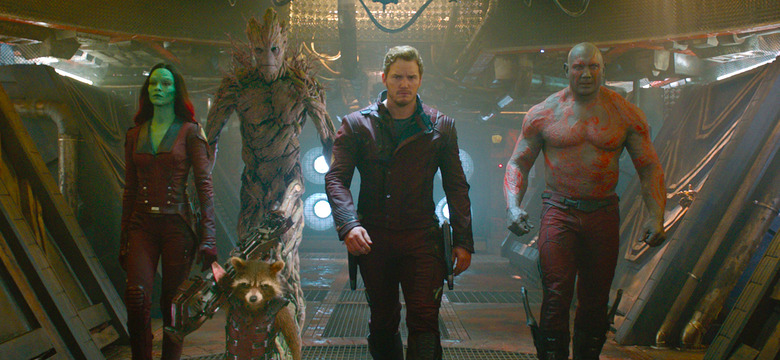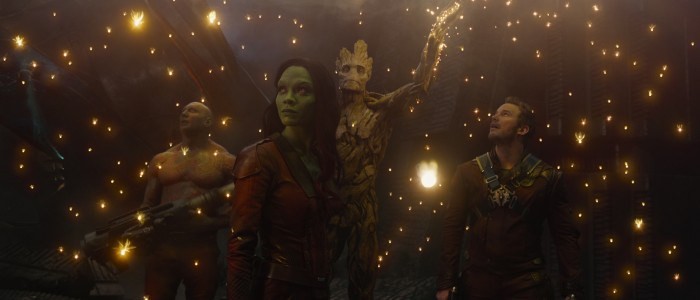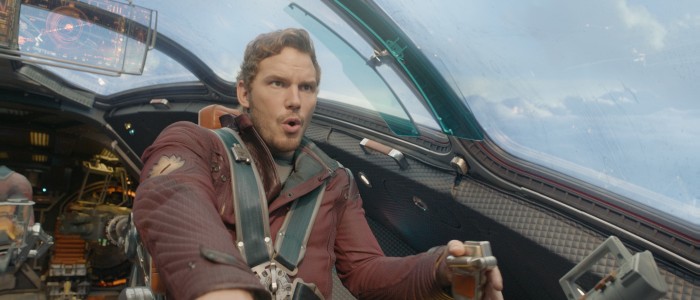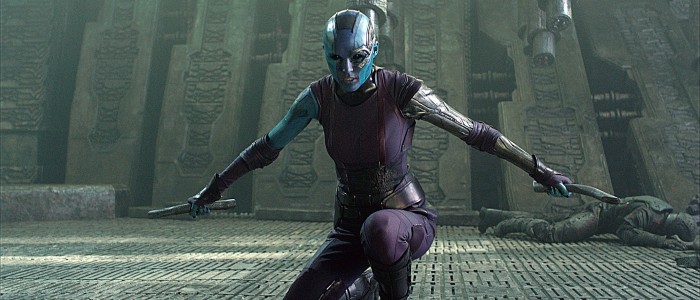The Unpopular Opinion: 'Guardians Of The Galaxy' Is One Of The Weakest MCU Movies
(Welcome to The Unpopular Opinion, a series where a writer goes to the defense of a much-maligned film or sets their sights on a movie seemingly beloved by all. In this edition: the massively popular Guardians of the Galaxy enters the crosshairs.)
Almost without fail, every published ranking of the Marvel Cinematic Universe (MCU) has the same two movies in the top spots: Captain America: The Winter Soldier and Guardians of the Galaxy. This trend is probably why most people give me a funny look when I tell them my favorite MCU movies are The Winter Soldier, Thor, and Iron Man 3. In fact, Guardians doesn't even make it into my top five. It might not be at the very bottom of the barrel, but it's certainly not at the top either.
James Gunn's take on Guardians of the Galaxy quickly earned rave reviews in 2014 for its fun and colorful space opera take on a lesser-known Marvel team. When I first saw it, I enjoyed it too... and then I quickly proceeded to forget it. It isn't that I consider Guardians an actively bad film, more that I view it as an actively average film with fundamental flaws that, when dug deeper into, make the film's shining surface fade much more quickly.
Unfortunately, these glaring flaws prevent me from placing it among the best of the MCU and instead have soured the film for me, especially within the larger context of the MCU.
Style Over Substance
Let's get this out of the way: Guardians of the Galaxy is absolutely a fun and beautiful film. That climactic scene with Groot (Vin Diesel) before the final battle is still breathtaking. And simply having fun at a movie shouldn't be downplayed, because it's one of the many reasons why films are as great as they are in our society. Escapism and enjoyment are legitimate reasons to prop up a film's merits.
However, Guardians' bold stylistic choices, while on their own are admirable, fail the movie both in terms of its narrative and characters as well as the film's place within the MCU. It's always struck me as odd to praise Guardians' fun-ness and humor, not on their own, but against other Marvel movies, when the MCU has always prided itself on being first and foremost a fun, funny, and exciting celebration of these characters. It's part of why fans, myself included, love the universe so much and it's an oft-cited contrast when people compare the MCU to the DC Extended Universe (DCEU).
You see, Guardians can't exist as it does without the history of the MCU and the tone it has worked tirelessly to set forth ever since 2008's Iron Man, which, I would argue, is just as funny as Guardians. So it's always seemed odd to me to pit Guardians against the rest of the MCU movies, especially when claiming it's somehow more fun and colorful (I'll direct you to Thor as another Marvel movie that's just as beautiful and entertaining, as I continue my never-ending quest to give Thor its proper due).
What happens with Guardians, unfortunately, is that it loses sight of its characters and narrative in favor of this audacious style and commitment to as many one-liners as it can cram in, regardless of how funny they actually are.
The plot of Guardians of the Galaxy is, to put bluntly, a mess, which is probably what also makes it so bland and forgettable. There's an orb? A space government? Glenn Close and Benicio Del Toro in underserved roles? Leading characters who are meant to form a sort of found family (a favorite trope of mine in fiction) but instead, when placed together, become versions of their worst selves? At least Guardians keeps it consistent with the rest of the Marvel films by having a boring villain.
At its core, what has made the MCU so successful are the wonderful characters at the heart of the universe's various narratives. Guardians seem to forget that, though. Groot is the most memorable of the characters and that's because he has a schtick – a completely adorable schtick, absolutely, but a schtick nonetheless. It's difficult to root for the Guardians and that's a huge problem. As Nebula (Karen Gillan) says in the trailer for Vol. 2, "All you do is yell at each other. You're not friends," and frankly? It's kind of true.
There is a lack of heart (yes, even Groot can't save the film's weakly beating organ entirely) and only a flimsy dedication to telling a story that is serviced by compelling and fun characters. Guardians, instead, is dedicated to everything on its surface, not its foundation.
The Wrong Protagonist
One of the biggest narrative problems with Guardians of the Galaxy is that it has the wrong protagonist. In a film whose story lies entirely with Gamora (Zoe Saldana), we're instead saddled with Peter Quill (Chris Pratt, who seems to play the same character in his movie career following what is still his best role to date, Andy Dwyer on Parks and Recreation).
"But Peter Quill is the leader in the comics! Peter Quill is the audience surrogate!"
Sure, these things may be true but unfortunately, the narrative set forth in the movie doesn't support this. For all intents and purposes, Gamora is the film's hero. Raised by Thanos (Josh Brolin) and trained under the tutelage of Ronan (Lee Pace) with her adoptive sister, Nebula, she has the most connection to the villains of the film and the most growth over the course of the film's plot. I get that this is a team film, but in a team film there's a leader, a character whose story is more fleshed out than the rest. Here, it tries to be Peter's film, but it's not – it's Gamora's. And not acknowledging or following through on that is a sign of the film's weakness.
This is, frustratingly, also part of a larger trend in Hollywood in which the far more capable and interesting female character is sidelined for the more average male (and usually white) character. In fact, another Marvel movie does the same thing: 2015's Ant-Man, although that movie explicitly addresses this issue (albeit with a rather poor excuse, but at the very least Scott Lang is a more compelling protagonist than Peter). It's great we can recognize the badass nature of characters like Gamora and Ant-Man's Hope Van Dyne, but it doesn't make it any less aggravating that they're not given the due they deserve.
However, this specific narrative choice is also a hint at something more disquieting in the film: its numerous and blatant moments of misogyny.
Casual Misogyny
At the very start of the film, audiences meet Peter Quill and we learn a few things about him, including that he's a tough-guy outlaw and... that he completely forgets Bereet, a woman with whom he had a nondescript relationship (although it's definitely implied they were sleeping together), was on his ship. So our hero is awesome for sleeping with women and then forgetting about them? Cool?
Definitely not cool.
The problem here isn't with Peter, it's the fact that the movie treats this moment as a joke, and that it never gives Peter the decency to learn from it or grow. Women are dispensable (such as the girl with the Collector who does some dusting and then dies) and that's totally fine. Some might argue it's more forgivable because these are minor characters, but the casual misogyny of the film doesn't end here. It is, in fact, also applied to Gamora.
Guardians is a great example that simply because a film passes the Bechdel Test (which this film does, with Gamora and Nebula), that doesn't mean it's feminist or doing right by its female characters. Instead, because of how the film and its universe treats the female characters, it decidedly fails them, such as when Drax (Dave Bautista), whose whole thing is that he takes things literally, calls Gamora a "whore." Or when Peter calls Ronan a "bitch" at the end of the film, revealing the lack of care over using misogynistic language.
The film also suffers from its male gaze and how it depicts Gamora on the screen. Where other MCU films have bucked the trend by, instead, providing a refreshingly female gaze (Thor and Captain America: The First Avenger, specifically), Guardians instead shoots Gamora with a specific focus on her body. No one can deny that Gamora kicks ass in her own right, but for her to be sexualized by the camera, whether due to Peter's attraction to her or this simply being the nature of Hollywood, is unfortunate. In contrast, look at the way Lady Sif is shot in Thor.
Hopefully Vol. 2 gets this better (although the lack of a female screenwriter is also disheartening and Peter seems as insufferable as ever in the trailers, especially regarding his relationship with Gamora), but it's certainly a problem in the first film.
Its Larger Relationship to the MCU
There's something exhilarating and refreshing about the fact that Guardians of the Galaxy is so separate from the larger Marvel Cinematic Universe. Regardless of whether or not you think it works, it can do its own thing. And yet... that freedom can also be a downfall.
There are many things the MCU prides itself on and gets right to be as successful as it is; one of those things is the commitment to its shared, cohesive universe. The only thing that ties Guardians to the rest of the MCU is the presence of Thanos who, frankly, doesn't do much and sticks out like a sore thumb. At the time of the film's release, Gunn acknowledged this issue, explaining that Thanos does more for the MCU than for Guardians, which is good, but it doesn't solve the problem.
Perhaps this is a problem that couldn't have been solved and simply had to exist. After all, Guardians doesn't have the convenient plot that Thor does, which takes the Norse god from Asgard to Earth, thus allowing the film's ties to the MCU to be stronger. Instead, Guardians takes place entirely in space, far away from anything happening on Earth. Yet the film also couldn't have gotten away with no ties to the MCU, not if it wanted to play in the same sandbox. So there's no easy solution to this conundrum, but it's something worth acknowledging.
The Guardians, following their much-anticipated sequel, will next appear in 2018's Avengers: Infinity War, finally bringing them definitively into the MCU's fold. But is this separation from the shared universe until then going to be a problem? It's hard to say, especially because of how meticulously the rest of the MCU's films have been tied into one another, but it makes the first Guardians of the Galaxy film struggle as a film that's meant to be a part of a shared universe, regardless of whether or not it works on its own.
Final Thoughts
There are far worse offenders in the realm of superhero films than Guardians of the Galaxy. But I simply don't see it as one of the best Marvel movies, nor as a particularly inspired sci-fi action flick. Its treatment of female characters is tasteless and off-putting, its sense of fun spans the length of the movie but not much longer, and it feels hollow at its center. Perhaps I've been spoiled by the exploration of PTSD in the Iron Man films, Steve Rogers' conflict between his duty to Bucky and to the Avengers, and Thor's journey to discover that what it takes to be a good king is to be a good man, but Guardians didn't give me any of that, or anything else as touching and profound.
The MCU is fun but it's also built on strong characters and narratives that all at once serve the superhero genre and dig deeper into it.
So let me know when Gamora and Hope van Dyne team up to save the galaxy.




